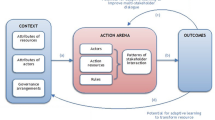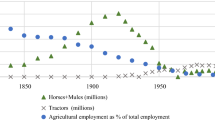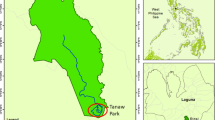Abstract
‘Greening’ the economy requires the creation of new markets in ecological goods and services, and there exist today many different payment mechanisms that differ significantly in terms of their distributional outcomes. Laura Rival compares three case studies: a forest conservation scheme involving payments for ecosystem services (PES) in the state of Amazonas, Brazil; Ecuador's government-led PES aimed at avoiding carbon dioxide emissions by keeping oil in the ground; and a ten-year grassroots project in the state of Minas Geiras, Brazil, which combats social exclusion with the dissemination of agroecological practices among poor small-scale farmers to provide viable economic alternatives to out-migration. The three programmes result from the efforts of social actors who have sought to create innovative sustainability-enhancing institutions in order to achieve environmental and social policy integration.
Similar content being viewed by others
Notes
REDD: ‘Reducing emissions from deforestation and forest degradation’. REDD+ includes additional activities such as ecosystem services derived from biodiversity conservation.
ProAmbiente was the first formal PES scheme established in Brazil. Small farmers were paid to minimize deforestation, the use of fire and experiment with agroforestry. Initiated by grassroots organizations, it was transferred to the federal government in 2004 but suffered from lack of sustained funding.
If a future government ever decided to exploit the oil, the money invested plus interests would be returned to the contributors with no more risks than repayment of the external debt.
Official negotiators stress that the amount of direct CO2 emissions that would be prevented with Y-ITT surpasses the annual emissions of France (373 million tons) or Brazil (332 million tons), with a total economic value of US$8.067 billion.
57.3 percent live in the town and 42.7 percent in the surrounding rural areas. Agriculture constitutes only 5.7 percent of the municipality's economy, compared with 15 percent for mining and 74 percent for services.
References
Bebbington, Anthony (ed.) (2011) Social Conflict, Economic Development and Extractive Industry. Evidence from South America, London: Routledge.
Bovarnick, Andrew, Francisco Alpizar and Charles Schnell (eds.) (2010) The Importance of Biodiversity and Ecosystems in Economic Growth and Equity in Latin America and the Caribbean: An economic valuation of ecosystem, New York: United Nations Development Programme.
Brondizio, Eduardo S., Elinor Ostrom and Oran R. Young (2009) ‘Connectivity and the Governance of Multi-Level Social-Ecological Systems: The role of social capital’, Annual Review of Environmental Resources 34: 253–278.
Button, Jillian (2008) ‘Carbon: Commodity or currency? The case for an international carbon market based on the currency model’, Harvard Environmental Law Review 32: 571–596.
Chapin, Stuart F., Gary P. Kofinas and Carl Folke (2009) Principles of Ecosystem Stewardship. Resilience-Based Natural Resource Management in a Changing World, London: Springer.
Daily, Gretchen, Tore Söderqvist, Sara Aniyar, Kenneth Arrow, Partha Dasgupta, Paul R. Ehrlich, Carl Folke, AnnMari Jansson, Bengt-Owe Jansson, Nils Kautsky, Simon Levin, Jane Lubchenco, Karl-Göran Mäler, David Simpson, David Starrett, David Tilman and Brian Walker (2000) ‘The Value of Nature and the Nature of Value’, Science 289 (5478): 395–396.
Engel, Stefanie, Stefano Pagiola and Sven Wunder (2008) ‘Designing Payments for Environmental Services in Theory and Practice: An overview of the issues’, Ecological Economics 65 (4): 663–674.
Farley, Joshua and Robert Costanza (2010) ‘Payments for Ecosystem Services: From local to global’, Ecological Economics 69: 2060–2068.
Kanowksi, Peter J., Constance L. McDermott and Benjamin W. Cashmore (2010) ‘Implementing REDD+: Lessons from analysis of forest governance’, Environmental Science and Policy 14: 111–117.
Kumar, Pushpam (ed.) (2010) The Economics of Ecosystems and Biodiversity: Ecological and economic foundations, London: Earthscan.
MA (Millenium Ecosystem Assessment) (2005) Ecosystems and Human Well-Being: A synthesis, Washington DC: Island Press.
Muradian, Roldan, Esteve Corbera, Unai Pascual, Nicolás Kosoy and Peter H. May (2010) ‘Reconciling Theory and Practice: An alternative conceptual framework for understanding payments for ecosystem services’, Ecological Economics 69: 1202–1208.
Norgaard, Richard B. (2010) ‘Ecosystem Services: From eye-opening metaphor to complexity blinder’, Ecological Economics 69: 1219–1227.
Rival, Laura (2010) ‘Ecuador's Yasuní-ITT Initiative: The old and new values of petroleum’, Ecological Economics 70: 358–365.
Rival, Laura (2011a) ‘Planning Development Futures in the Ecuadorian Amazon: The expanding oil frontier and the Yasuní-ITT initiative’, in Anthony Bebbington (ed.) Social Conflict, Economic Development and Extractive Industry. Evidence from South America, pp 155–173, New York: Routledge.
Rival, Laura (2011b) ‘Ecological Threats, New Promises of Sustainability, and the Evolving Political Economy of Land Use Change and Rural Development in Latin America’, http://www.unrisd.org, accessed 1 November 2011.
Sachs, Jeffrey, Jonathan E.M. Baillie, William J. Sutherland, Paul R. Armsworth, Neville Ash, John Beddington, Tim M. Blackburn, Ben Collen, Barry Gardiner, Kevin J. Gaston, H.Charles J. Godfray, Rhys E. Green, Paul H. Harvey, Brett House, Sandra Knapp, Noëlle F. Kümpel, David W. Macdonald, Georgina M. Mace, James Mallet, Adam Matthews, Robert M. May, Owen Petchey, Andy Purvis, Dilys Roe, Kamran Safi, Kerry Turner, Matt Walpole, Robert Watson and Kate E. Jones (2009) ‘Biodiversity Conservation and the Millennium Development Goals’, Science 325 (5947): 1502–1503.
Additional information
Compares three case studies of new markets in ecological goods and services
Rights and permissions
About this article
Cite this article
Rival, L. Sustainable Development through Policy Integration in Latin America: A comparative approach. Development 55, 63–70 (2012). https://doi.org/10.1057/dev.2011.111
Published:
Issue Date:
DOI: https://doi.org/10.1057/dev.2011.111




